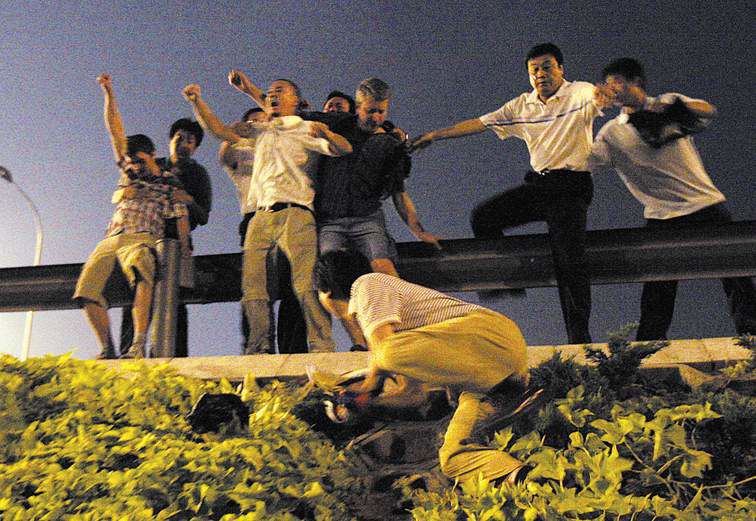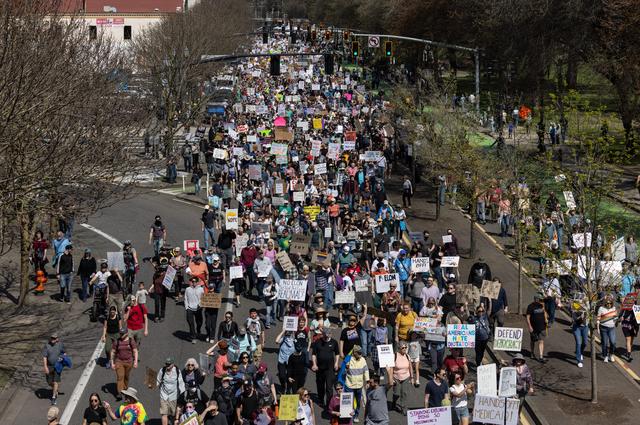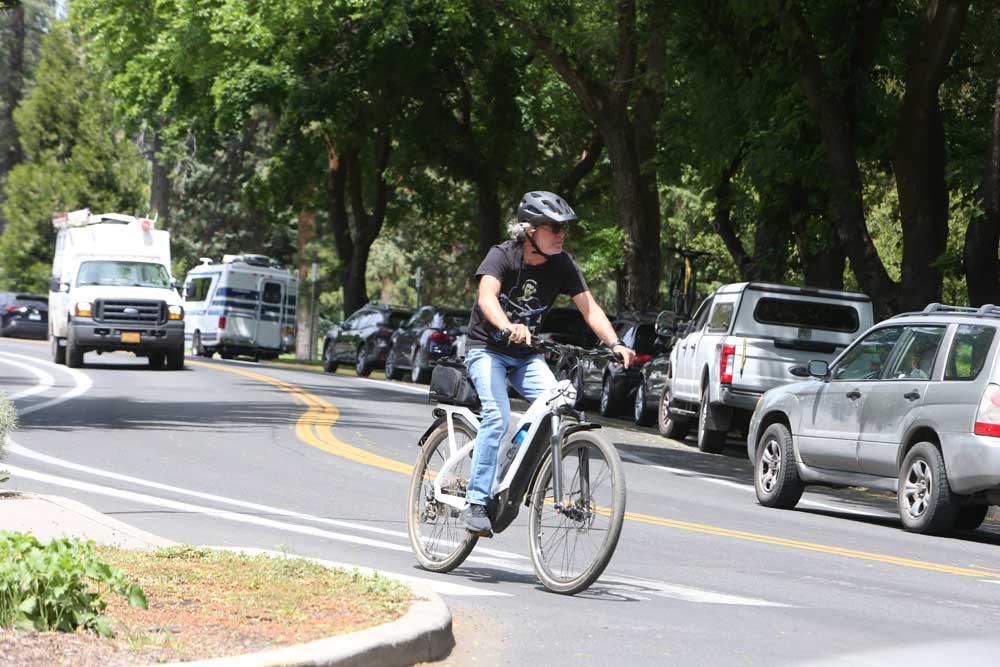Some would-be China protesters sentenced to hard labor
Published 5:00 am Sunday, August 24, 2008

- A security official, foreground, tries to grab a Tibetan flag from a protester outside the Olympic stadium in Beijing on Thursday.
BEIJING — The park around the Temple of the Sun — built four centuries ago for ritual sacrifices to the sun — buzzed with modern activity, including badminton and table tennis. A boy ran around with a toy helicopter. Little kids bounced on a trampoline.
The park was one of three sites in Beijing set aside by the Chinese government for legal protests during the Olympics. The only discontent spotted here one morning this past week came from a young boy upset that his mother wouldn’t let him keep chasing a butterfly.
There was no protest zone ever set up. The China Daily, an English-language outlet for the Chinese government, had a headline this week: “77 requests, no protests at Games.” The newspaper went on to say: “Up to yesterday, 74 applications had been withdrawn after amicable settlement between the parties and authorities.”
If anything, the protest application process has made it easier for China to arrest dissidents.
Several Chinese applicants have been detained after applying to protest. Two elderly women, 79 and 77 years old, were ordered to spend a year in a labor camp, a relative told The Associated Press.
Two Philadelphia-area men were also detained, according to family members and Students for a Free Tibet, though there was no indication they had applied for permission to protest.
Brian Conley, of Philadelphia, and Jeffrey Rae, of Wayne, Pa., were still being held Saturday. Rae’s father, William, said by phone Saturday that he had spoken with a U.S. embassy officer, who indicated Conley and Rae had been given 10-day sentences. The embassy official said embassy personnel had met with Rae.
“He said he was being treated well and felt OK,” William Rae said. The embassy official, William Rae said, told him his son was one of 10 people in a cell, with another American in the group, and that Jeff Rae sees Conley at times during the day.
Detention ordered
AP reported Saturday that Chinese police have sentenced at least 10 foreigners to 10 days of detention for protesting during the Olympic Games, according to activists and officials.
Beijing’s Public Security Bureau did not immediately respond to requests Saturday for comment, according to AP. The bureau issued a statement Thursday saying a separate group of six foreigners who were arrested Tuesday were ordered to serve 10 days of detention. Police did not identify the detainees, but Students for a Free Tibet said Conley and Rae were among that group of bloggers, artists and activists from the United States.
After the Olympics closes today, China is almost assured of winning more gold medals than any other nation. But China has fallen short of opening itself to dissent and even dialogue, as it promised when the International Olympic Committee awarded Beijing the Games in 2001.
The IOC “has “completely mishandled the human-rights issues in these Games,” said Minky Worden, a spokesperson for Human Rights Watch.
The China Daily noted that the move to set aside the protest zones “is in line with Beijing’s promises to the International Olympic Committee to adhere to the Olympic traditions, such as free expression outside the sporting venues.”
“It must be the most cynical interpretation of the freedom to protest — that you follow the rules, apply five days in advance, then are turned away or put under house arrest or worse,” Worden said in a telephone interview, adding that most Chinese applicants were aware of the potential risks.
“How desperate do you have to be to file a protest that would result in likely detention?” Worden said.
Worden noted that in many cases, the protestors “don’t just represent themselves. In some cases, they represent thousands of people who have similar problems.” And the problem, she said, may not merely involve being evicted from their house, “but being evicted in the middle of the night because a developer paid off a Communist Party official.”
IOC President Jacques Rogge talked of silent diplomacy being the most effective means of affecting change.
“We’re a sports organization. We stay clearly within our role, which is to bring sport to host countries,” IOC spokesperson Giselle Davies told the AP on Wednesday. “We’re not an organization that is best placed or has the capacity to deal with human-rights issues.”
Foreign Ministry spokesman Qin Gang declined to discuss the specifics of the protest policy at a news conference Wednesday.
“In China, like in other countries, to apply for a demonstration, you have to obey the law,” Qin said.
The concern now is that these Olympics will have substantially set back human rights in China, Worden said, noting that if the increased surveillance of citizens for the Olympics and the shutting down of protests continues, “that would be a pretty negative legacy. If the Chinese government had found a way for people to peacefully protest, and it had lived up to its promise, that could have shown the government the way to deal with the chronic national problem of protests.”
The Chinese government itself reported that there were more than 50,000 public protests in 2005, the last year the government made such figures public.
“This is the single issue that (most concerns) the Chinese government, the Chinese Communist Party, because it goes to control,” Worden said.
Human Rights Watch detailed the case of Ji Sizun, 58, “a self-described grass-roots legal activist” in China who was arrested on Aug. 11, three days after he had applied for a permit to hold a protest in one of the zones. According to Human Rights Watch, in his application, Ji stated that the protest would call for greater participation of Chinese citizens in political processes and “denounce rampant official corruption and abuses of power.” He was arrested after returning to the police station to check on the status of his application, witnesses told Human Rights Watch.
Two AP photographers were roughed up by plainclothes security officers, forced into cars and taken to a nearby building where they were questioned before being released. Memory cards from their cameras were confiscated.
Home demolished
The protests by Chinese citizens get little press attention here. Police in Beijing also declined an application by Zhang Wei in late July to protest over the demolition of her home for Olympics-related development. On Aug. 12, Zhang’s son Mi Yu told the AP that the district court sentenced Zhang to a month in prison for “disturbing social order” in connection with a small protest Zhang took part in last week in Beijing’s Qianmen district with around 20 of her former neighbors.
The AP reported that the two elderly women were still at home three days after being officially notified they would have to serve a yearlong term of re-education through labor but were under surveillance by a government-backed neighborhood group, said Li Xuehui, the son of one of the women.
Li said no cause was given for the order to imprison his 79-year-old mother, Wu Dianyuan, and her neighbor Wang Xiuying, 77.
“Wang Xiuying is almost blind and disabled. What sort of re-education through labor can she serve?” Li told the AP in a telephone interview. “But they can also be taken away at any time.”
The sports events have gone off flawlessly at these Olympics, while inside Ritan Park, home to the Temple of the Sun, there are no signs of unrest, just this sign by the South Gate: “Welcome Olympic Games with joyfulness and construct a harmonious society.






